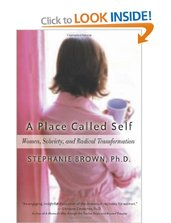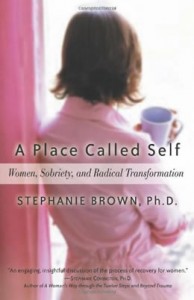A series of my blog posts based on Stephanie Brown’s wonderful book, A Place Called Self: Women, Sobriety, and Radical Transformation. In her book, Stephanie talks about what happens to women in recovery, how they think, how they feel, their problems, the good things, etc. (The book is relevant to men as well!)
‘Women: Drinking and Recovery’ by Dr David McCartney
 My good friend Michael Scott, of Michael’s Recovery Story, and I attended a Public Awareness Meeting of Alcoholics Anonymous (AA) in a Perth suburb today. I was asked to talk for five minutes about my recovery work over the years. I also described some of the factors that facilitate recovery.
My good friend Michael Scott, of Michael’s Recovery Story, and I attended a Public Awareness Meeting of Alcoholics Anonymous (AA) in a Perth suburb today. I was asked to talk for five minutes about my recovery work over the years. I also described some of the factors that facilitate recovery.
We listened to a number of AA members share their stories and I have to say that I was blown away by the high quality of the shares. They were moving, inspirational and insightful. More women than men spoke. It was such a good meeting and I really enjoyed talking to people after the actual meeting ended.
Imagine my surprise when I got home to find that my good friend Dr David McCartney had just uploaded a blog post about women, drinking and recovery.
What Happens to Women in Recovery: Stephanie Brown
 In the Resources section of the website, I have a series of my posts under the title Stephanie Brown on Recovery. These posts are based on Stephanie Brown’s wonderful 2004 book A Place Called Self: Women, Sobriety, and Radical Transformation. In her book, Stephanie talks about what happens to women in recovery, how they think, how they feel, their problems, the good things, etc. (The book is relevant to men as well!) Here is the main part of the first of my posts, entitled ‘What is Recovery’, according to Stephanie Brown (Part 1).
In the Resources section of the website, I have a series of my posts under the title Stephanie Brown on Recovery. These posts are based on Stephanie Brown’s wonderful 2004 book A Place Called Self: Women, Sobriety, and Radical Transformation. In her book, Stephanie talks about what happens to women in recovery, how they think, how they feel, their problems, the good things, etc. (The book is relevant to men as well!) Here is the main part of the first of my posts, entitled ‘What is Recovery’, according to Stephanie Brown (Part 1).
“‘Recovery has held so many surprises for me. Some good. Some bad. I didn’t know I could hurt so much. But I also didn’t know I could love so much and be so loved. I had no idea that recovery was also learning how to be in intimate relationships, learning how to have close, wonderful friends. Then there’s my marriage. My husband and I have developed a rich life together. And get this – I really like myself now. Learning about who I am and accepting me, that’s been the hardest part of recovery – and the best. I wouldn’t trade this path for anything in the world.’ Anne, Recoveree
‘From Trauma to Transformative Recovery’ by Bill White
 ‘Between 1986 and 2003, I served as the evaluator of an innovative approach to the treatment of addicted women with histories of neglect or abuse of their children. Project SAFE eventually expanded from four pilot sites to more than 20 Illinois communities using a model that integrated addiction treatment, child welfare, mental health, and domestic violence services. This project garnered considerable professional and public attention, including being profiled within Bill Moyers’ PBS documentary, Moyers on Addiction: Close to Home.
‘Between 1986 and 2003, I served as the evaluator of an innovative approach to the treatment of addicted women with histories of neglect or abuse of their children. Project SAFE eventually expanded from four pilot sites to more than 20 Illinois communities using a model that integrated addiction treatment, child welfare, mental health, and domestic violence services. This project garnered considerable professional and public attention, including being profiled within Bill Moyers’ PBS documentary, Moyers on Addiction: Close to Home.
My subsequent writings on recovery management and recovery-oriented systems of care were profoundly influenced by the more than 15 years I spent interviewing the women served by Project SAFE and the Project SAFE outreach workers, therapists, parenting trainers, and child protection case workers. This blog offers a few reflections on what was learned within this project about the role of trauma in addiction and addiction recovery.
New Resource: Stephanie Brown on Recovery
 I’ve added the following to the Resources section.
I’ve added the following to the Resources section.
‘These blogs are based on Stephanie Brown’s wonderful book, A Place Called Self: Women, Sobriety, and Radical Transformation. In her book, Stephanie talks about what happens to women in recovery, how they think, how they feel, their problems, the good things, etc. (The book is relevant to men as well!)
What is Recovery? (Part 1)
“Recovery has held so many surprises for me. Some good. Some bad. I didn’t know I could hurt so much. But I also didn’t know I could love so much and be so loved.”
“What is Recovery?” according to Stephanie Brown (Part 3)
 In A Place Called Self, Stephanie Brown emphasises that in recovery a woman transforms the way she thinks about herself, as well as the way she thinks about life itself. She points out two common myths about recovery, the first of which I’ll discuss here: ‘Recovery is moving from bad to good.’
In A Place Called Self, Stephanie Brown emphasises that in recovery a woman transforms the way she thinks about herself, as well as the way she thinks about life itself. She points out two common myths about recovery, the first of which I’ll discuss here: ‘Recovery is moving from bad to good.’
Many women think that being addicted is evidence of ‘shameful neediness, of deep and lasting failures.’ Many addicted women are trying to do their best, to be a good mother, wife and friend, yet they feel bad. They believe themselves to be a bad person.
“What is Recovery?” according to Stephanie Brown (Part 2)
 In an earlier blog, I referred to Stephanie Brown’s book A Place Called Self, in which she describes recovery as radical change in personal identity, or the self. Stephanie goes on to emphasise a number of myths about recovery.
In an earlier blog, I referred to Stephanie Brown’s book A Place Called Self, in which she describes recovery as radical change in personal identity, or the self. Stephanie goes on to emphasise a number of myths about recovery.
Firstly, the dictionary definition of recovery states ‘a return to a normal condition.’ This would suggest that in addiction recovery the person goes back to where they were before they became addicted. In fact, this is rarely the case. Stephanie emphasises that recovery is more like a starting over than a restoration of what was lost during addiction. This is because for many people the real self was never really developed.
‘What is Recovery?’ according to Stephanie Brown (Part 1)
 ‘Recovery has held so many surprises for me. Some good. Some bad. I didn’t know I could hurt so much. But I also didn’t know I could love so much and be so loved. I had no idea that recovery was also learning how to be in intimate relationships, learning how to have close, wonderful friends. Then there’s my marriage. My husband and I have developed a rich life together. And get this – I really like myself now. Learning about who I am and accepting me, that’s been the hardest part of recovery – and the best. I wouldn’t trade this path for anything in the world.’ Anne, Recoveree
‘Recovery has held so many surprises for me. Some good. Some bad. I didn’t know I could hurt so much. But I also didn’t know I could love so much and be so loved. I had no idea that recovery was also learning how to be in intimate relationships, learning how to have close, wonderful friends. Then there’s my marriage. My husband and I have developed a rich life together. And get this – I really like myself now. Learning about who I am and accepting me, that’s been the hardest part of recovery – and the best. I wouldn’t trade this path for anything in the world.’ Anne, Recoveree
This quote comes from the most wonderful book, A Place Called Self: Women, Sobriety, and Radical Transformation. Stephanie Brown’s book talks about what happens to women in recovery, how they think, how they feel, their problems, the good things, etc. (And before you ask, the book is relevant to men as well!)
Stephanie Brown describes recovery as a journey, a process. It is a radical change in personal identity (or the self). See the words drugs and alcohol there. Nup! You can recover from all sorts of things, like mental mental health problems, loss of a loved one, trauma, etc.
‘What is Recovery?’ according to Stephanie Brown (Part 1)
 “Recovery has held so many surprises for me. Some good. Some bad. I didn’t know I could hurt so much. But I also didn’t know I could love so much and be so loved.
“Recovery has held so many surprises for me. Some good. Some bad. I didn’t know I could hurt so much. But I also didn’t know I could love so much and be so loved.
I had no idea that recovery was also learning how to be in intimate relationships, learning how to have close, wonderful friends. Then there’s my marriage. My husband and I have developed a rich life together.
And get this – I really like myself now. Learning about who I am and accepting me, that’s been the hardest part of recovery – and the best. I wouldn’t trade this path for anything in the world.” Anne, Recoveree


